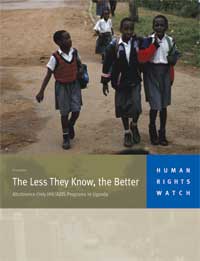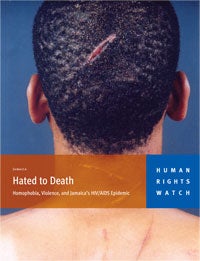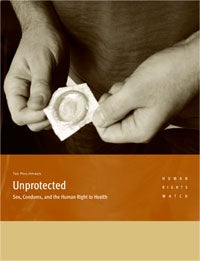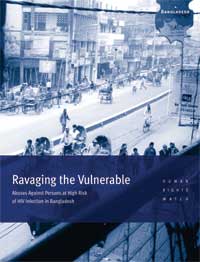 |
 |
 |
 |
“The Less They Know, the Better: Abstinence-Only and HIV/AIDS Programs in Uganda” Uganda: March 2005 Long regarded as a global leader in the fight against HIV/AIDS, Uganda—with the support and funding of the Bush Administration—has begun shifting its HIV-prevention strategies for youth from scientifically proven community-based and comprehensive prevention approaches to ideologically driven abstinence-only programs. Despite a dramatic drop in Uganda’s HIV prevalence rates over the last decade, from 15 percent in 1992 to six percent in 2002, surveys show that more than half of Ugandan girls still have sex by the age of 17, often without the use of condoms. With new programs focused on “Abstinence and Being Faithful”—the title of a draft policy released by the Ugandan AIDS Commission in 2004—AIDS advocates fear that condoms may disappear from prevention campaigns altogether. Since the release of that draft, the government has taken such measures as removing HIV/AIDS materials from primary school circulation (replacing them with books emphasizing morals and heterosexual marriage) and revoking the funding of groups that promote condom use. If Uganda is to curb the raging HIV/AIDS epidemic, it must address these damaging policy changes and initiate new prevention efforts. |
 |
“Hated to Death: Homophobia, Violence, and Jamaica’s HIV/AIDS Epidemic” Jamaica: November 2004 Jamaica’s growing AIDS epidemic has unfolded amidst widespread violence and discrimination against people living with HIV/AIDS, as well as homophobia fostered by both law and popular culture. Myths about HIV/AIDS have fueled this situation, as many Jamaicans believe that AIDS is strictly a disease of homosexuals and sex workers, and that it can be transmitted by casual contact. This ignorance has put people living with HIV/AIDS in Jamaica – as well as its lesbian and gay population – in a state of constant fear, exacerbated by the brutal murder of a leading gay rights activist in June 2004. Men who were perceived to be gay and people living with HIV/AIDS have commonly found themselves targets of violence and abuse by peers and police, and in some cases they have been driven from their homes and communities and mistreated or denied care by health workers. The Jamaican government in 2004 launched an ambitious project to provide antiretroviral treatment to people living with HIV/AIDS. For this initiative to succeed, the Jamaican government must make a commitment to ending the human rights violations that are fueling this epidemic. “If you make a police report, they start by making you, instead of the victim, the person that is wrong. The police ask, ‘Why all of a sudden they calling you a battyman [gay man]? How do they know you a battyman?’” |
 |
“Unprotected: Sex, Condoms, and the Human Right to Health in the Philippines” Philippines: May 2004 Condoms are the single most effective prevention technology against the sexual transmission of HIV, and the cornerstone of HIV/AIDS prevention efforts since the beginning of the epidemic. Yet in many countries – particularly those that face pressure from religious conservatives—legal and policy restrictions on condoms are fueling this epidemic. In the Philippines, the largest Catholic country in Asia, HIV/AIDS advocates who promote the use of condoms have faced an international assault. The Philippine government, under the administration of President Gloria Macapagal-Arroyo, is standing in the way of aggressive HIV prevention strategies by failing to support comprehensive reproductive health legislation. The government has banned the use of national funds for condom supplies, and permits local jurisdictions to prohibit condom distribution in health facilities. Additionally, by failing to provide proper education, the government has implicitly fueled common misconceptions about the ineffectiveness of condoms, which many Filipinos associate exclusively with sin, infidelity or sexual promiscuity. Though condoms are often available to those who can afford private health care, the poorest, most vulnerable members of society have been deprived of this lifesaving prevention method. Without proper education and the widespread availability of condoms, the Philippine government is risking premature and preventable death for many of its citizens. “I like to have plenty of condoms in my bag, but if I see the police, I throw my bag away.”
|
 |
“Ravaging the Vulnerable: Abuses Against Persons at High Risk of HIV in Bangladesh” August 2003 Evidence has shown that early in HIV/AIDS epidemics, when the disease is limited to specific populations engaging in high-risk behaviors, the most effective anti-AIDS strategy is to protect and respect the rights of these people. In Bangladesh, where HIV/AIDS rates are relatively low, the government has taken the opposite approach. Vulnerable groups, such as sex workers, drug users, and men who have sex with men, already marginalized from society, have faced frequent and violent abuse – abduction, rape, arrest and extortion – at the hands of police, as well as mastans, powerful thugs who sometimes act as musclemen for Bangladesh’s political parties. Such abuses have been shown to make these high-risk groups more difficult to reach with HIV prevention services, and less able to protect their own health. These abuses not only violate both Bangladeshi law and international human rights law, but reduce Bangladesh’s capacity to curtail an emerging epidemic. “One night, three police officers came to my hotel room and asked for sex. I was sleepy and refused. They started to beat me, especially on the face, and locked me in the room overnight.” |
 |
“Epidemic of Abuse: Police Harassment of HIV/AIDS Outreach Workers in India” July 2002 India has seen a sharp increase in the number of its people living with HIV/AIDS, from a few thousand in the early 1990s to an estimated 5.7 million adults and children in 2005. Sex workers, injection drug users and men who have sex with men have alarmingly high rates of infection, and the epidemic has begun spreading to the general population. The Indian government has recognized that in order to combat the spread of this disease, programs that provide information, condoms and HIV-testing are crucial. Yet despite support among the public health sectors for such programs, outreach efforts have been undermined by police harassment and abuse of HIV/AIDS workers. Police have beaten peer educators, claimed that outreach work promotes prostitution, and bought trumped-up criminal charges against activists. AIDS outreach workers have also been accused by police of being “threats to national security.” In order to appropriately address and combat the spread of this disease, the government of India must recognize the importance – and ensure the safety – of these outreach programs and their staff. “No one believes us about peer education; we are always accused of being sex workers. The police don't listen. They beat us in the street itself.” |
 |
September 2002 The Bush Administration has advocated hard for abstinence-only programs in the fight against HIV/AIDS. By portraying abstinence from sex until heterosexual marriage as the only acceptable behavior for youth, these programs deny adolescents basic information that could prevent the spread of sexually-transmitted diseases, including HIV/AIDS. By law, abstinence-only programs cannot “promote or endorse” condom use, nor provide HIV/AIDS information sensitive to the rights and needs of lesbian, gay, bisexual, and transgender youth. U.S. government-funded abstinence-only programs restricted teachers from providing complete, accurate information about HIV prevention, including information about using condoms to prevent HIV transmission; in some cases, teachers inaccurately told students that condoms were ineffective in preventing HIV transmission. The Bush administration has advocated for significant funding increases to support abstinence-only programs, notwithstanding the paucity of evidence that they work to delay adolescent sex, much less change the sexual behavior that puts adolescents at risk of HIV/AIDS. In addition, abstinence-only programs interfere with fundamental rights guaranteed by international law, including the right to “seek, receive and impart information and ideas of all kinds,” the right to nondiscrimination, and the right to the highest attainable standard of health “I don't know any other way but abstinence to prevent HIV.” |
